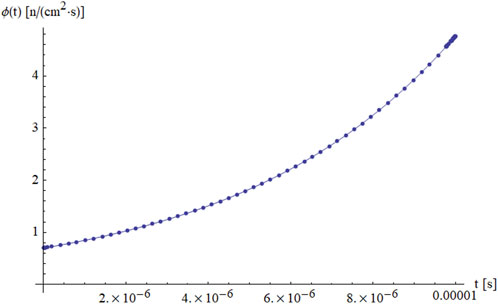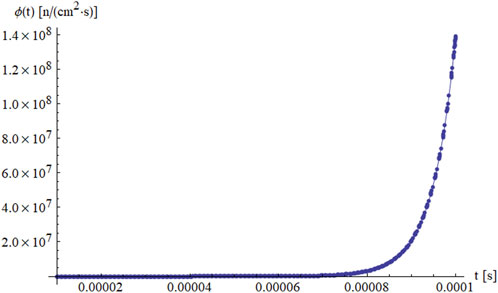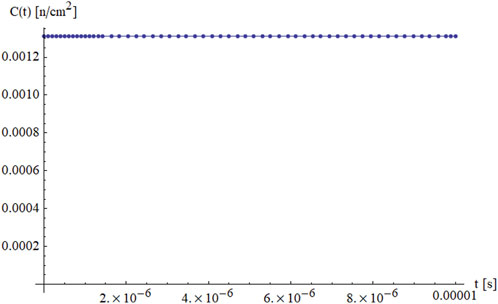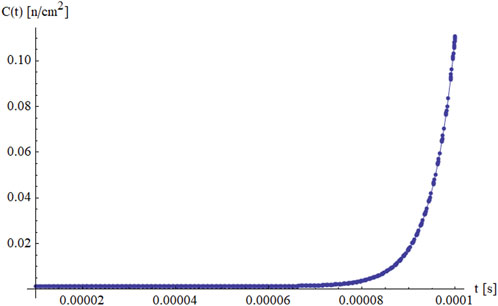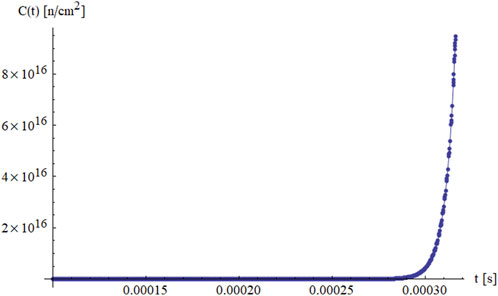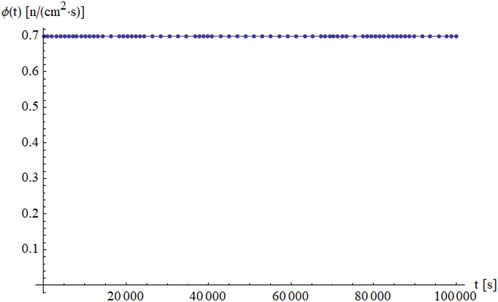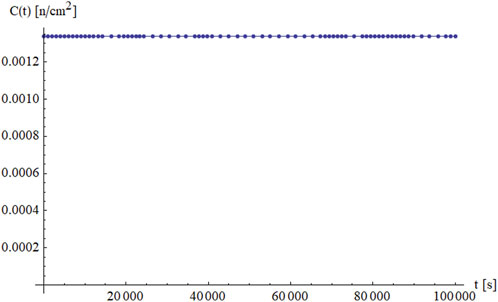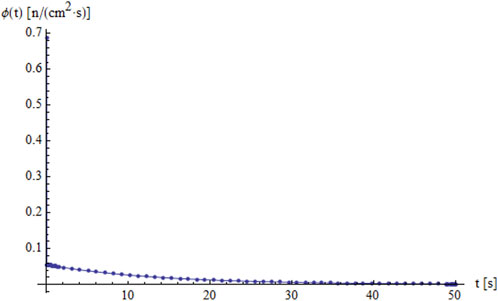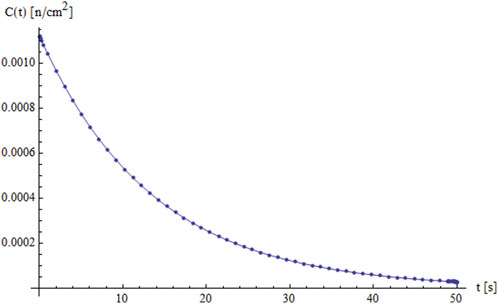- 1Department of Mathematics, College of Science and Humanities in Al-Kharj, Prince Sattam bin Abdulaziz University, Al-Kharj, Saudi Arabia
- 2Department of Mathematics, Faculty of Science, University of Tabuk, Tabuk, Saudi Arabia
This paper analyzes the dynamics of the neutron diffusion kinetic system under reflector boundaries/zero-flux gradient. An ansatz approach is proposed to exactly solve the governing system. The time-dependent solutions are exactly obtained in explicit forms, where spatial variations violate and the temporal behavior dominates the dynamics. Robust physical interpretation is provided for the neutron flux and the precursor concentration under three different cases, supercritical, critical, and sub-critical conditions. A key strength of the study lies in the effectiveness of the solution technique, particularly the use of the ansatz approach, which allows accurate handling of both short-term transients and long-term steady states. The method proves computationally efficient and stable across a wide range of reactivity levels.
1 Introduction
The neutron diffusion system is a popular/basic problem in reactor physics. It describes the behavior of neutron profile within a nuclear reactor. Additionally, it gives insight into how neutrons diffuse and interact with the reactor medium, accounting for processes such as neutron production, absorption, and leakage. Under specific boundary and initial conditions, it serves as a reliable approximation to the more comprehensive Boltzmann transport equation [1, 2]. A common and physically meaningful simplification is the application of the zero-flux gradient boundary condition, which assumes that the spatial gradient of the neutron flux is zero at the boundary. This condition is often used to model systems with symmetric boundaries or to idealize regions where neutron leakage is negligible. The zero-flux gradient implies that there is no net neutron current crossing the boundary, making it suitable for analysis of isolated or reflective systems [3].
Studying the neutron diffusion kinetics under this condition allows for a more tractable analysis of transient behavior in nuclear reactors, particularly during startup, shutdown, or perturbations in reactivity. It also enables the development of simplified models for reactor control and safety analysis, without compromising essential physical accuracy in specific configurations. This approach remains vital for both analytical studies and numerical simulations in reactor design and operational planning [4, 5]. Recent developments in both analytical and numerical solutions have significantly expanded the applicability of diffusion theory to modern nuclear systems, enabling more precise simulation of reactor transients, heterogeneous cores, and complex geometries. Analytical solutions to the neutron diffusion equation are particularly valuable for benchmark verification, conceptual design, and simplified reactor models. Over the past decade, researchers have developed closed-form or semi-analytical solutions for special cases [6, 7]. Emerging analytical studies also apply fractional calculus to neutron transport, modeling anomalous diffusion in disordered or stochastic media [8].
Modern numerical methods have dramatically advanced the fidelity and efficiency of neutron diffusion solvers, especially for multi-dimensional and time-dependent systems. These have been employed for high-resolution simulations in complex geometries, handling heterogeneity and material interfaces with improved accuracy [9, 10]. This paper analyzes a basic system:
under the Neumann boundary conditions (BCs):
and initial conditions (ICs):
where
Details of the parameters
2 Ansatz approach
Let us rewrite system (1)–(4) as.
under the ICs/BCs.
where
The anastz approach assumes that.
where
From Fourier analysis [30], we have
and similarly
Substituting Equations 10, 11 into Equations 5, 6 implies
and
respectively. This leads to the system:
which is a first-order linear system and to be solved under the conditions:
The next section addresses the solution of system (18) under the ICs (19).
3 Theoretical analysis
Theorem 1. The system:
has the exact solution:
where
Proof. By differentiating the first ODE in system (20) once with respect to
Substituting
Inserting
Therefore
where
given by
The first ODE in (20) gives
From (26) and (29),
where
Solving this system for
which finalizes the proof.
Theorem 2. Let
then
Proof. The assumptions (33) lead to
From Theorem 1,
and
Employing Equation 22 for
Substituting (38) into (36), then
From Equation 19, one can write
We also have
and
The product
Inserting
Thus
and this completes the proof.
4 The exact solution
In the previous section, the solution of system (20) was explicitly obtained in terms of exponential and hyperbolic functions. This section invests the results obtained by Theorem 2 to construct the exact solution of problem (1)–(4). To do that, we begin with assigning the values of
Consequently.
Accordingly, we obtain
and
Therefore,
and
respectively, where
and
Employing the quantities
and
It can be shown that the solutions (56) and (57) satisfy problem (1)–(4) through direct substitution. Physical interpretation of such solutions is to be addressed in the next section.
5 Numerical results and behavior of the system
This section conducts some numerical results for the behavior of the neutron flux and the precursor concentration. The parameters values
5.1 Supercritical case
Figures 1, 2 present the time evolution of the neutron flux
Figure 3 shows the corresponding behavior of the delayed neutron precursor concentration
Figures 4, 5 offer a closer look at how the delayed neutron precursor concentration
In Figure 5, which covers a slightly longer time domain up to
5.2 Critical case
Figure 6 shows how the neutron flux
5.3 Sub-critical case
In contrast, Figure 8 presents the sub-critical case,
6 Conclusion
In this paper, a direct ansatz approach was applied to solve the neutron diffusion system under Neumann-Neumann boundary conditions (zero-flux gradient at boundary). An ansatz approach was applied to exactly solve the governing system. Explicit time-dependent solutions were obtained, where spatial variations violate. Detailed physical explanation was discussed for the behavior of the neutron flux and the precursor concentration under the supercritical, the critical, and the sub-critical conditions. Although the methodology is classic, it reflects the simplicity of the ansatz approach to solve the current system under the boundary conditions 3 and 4. The presented simulation cases offer a clear and consistent picture of neutron flux and precursor dynamics across different reactivity conditions. In supercritical scenarios, the model captures the sharp rise in neutron flux and the delayed buildup of precursors, while critical conditions show stable behavior, and sub-critical cases exhibit smooth decay over time. All results align well with theoretical expectations and reflect the core physics of reactor kinetics. The results revealed that the suggested approach was computationally efficient and stable across a wide range of reactivity levels. Overall, the model offers both theoretical clarity and practical utility, making it a useful tool for early-stage reactor design, control analysis, and safety assessment in systems where simplified kinetics are appropriate. Although the present model assumes idealized conditions: no neutron leakage, no feedback mechanisms, one-group approximation and constant parameters, it can be viewed as an application of the ansatz approach to solve a basic neutron diffusion model under zero-flux conditions. To overcome such limitations, the ansatz approach may deserve further extension to analyze other complex forms (realistic reactor scenarios) of the classical/fractional diffusion systems in the spherical and hemispherical reactors in addition to other different geometries subject to various physical factors [40–47].
Data availability statement
The original contributions presented in the study are included in the article/supplementary material, further inquiries can be directed to the corresponding authors.
Author contributions
EE-Z: Conceptualization, Data curation, Formal Analysis, Funding acquisition, Project administration, Supervision, Writing – original draft, Writing – review and editing. AE: Conceptualization, Data curation, Formal Analysis, Investigation, Writing – original draft, Writing – review and editing. LS: Conceptualization, Data curation, Formal Analysis, Methodology, Writing – original draft, Writing – review and editing.
Funding
The author(s) declare that financial support was received for the research and/or publication of this article. “The authors extend their appreciation to Prince Sattam bin Abdulaziz University for funding this research work through the project number (PSAU/2025/01/32274)”.
Conflict of interest
The authors declare that the research was conducted in the absence of any commercial or financial relationships that could be construed as a potential conflict of interest.
Generative AI statement
The author(s) declare that no Generative AI was used in the creation of this manuscript.
Any alternative text (alt text) provided alongside figures in this article has been generated by Frontiers with the support of artificial intelligence and reasonable efforts have been made to ensure accuracy, including review by the authors wherever possible. If you identify any issues, please contact us.
Publisher’s note
All claims expressed in this article are solely those of the authors and do not necessarily represent those of their affiliated organizations, or those of the publisher, the editors and the reviewers. Any product that may be evaluated in this article, or claim that may be made by its manufacturer, is not guaranteed or endorsed by the publisher.
References
1. Lamarsh JR, Baratta AJ. Introduction to nuclear engineering. 3rd ed. Upper Saddle River, NJ: Prentice Hall (2001).
4. Lewis EE, Miller WF. Computational Methods of Neutron Transport. La Grange Park. IL: American Nuclear Society (1993).
5. Cacuci DG. Handbook of nuclear engineering. In: Nuclear engineering fundamentals, 1. New York: Springer (2010).
6. Arslan K, Aksan SI. Analytical solutions for transient neutron diffusion in multi-region systems using laplace transforms. Prog Nucl Energy (2019) 115:41–50. doi:10.1016/j.pnucene.2019.03.002
7. Ibeid HM, Abu-Mulaweh YS, Kapustin A, Kiselev A, Ryzhov N, Yudina T. Estimation of system code SOCRAT/V3 accuracy to simulate the heat transfer in a pool of volumetrically heated liquid on the basis of BAFOND experiments. Ann Nucl Energy (2021) 151:107902. doi:10.1016/j.anucene.2020.107902
8. Ghanavati S, Faghihi F, Dast-Belaraki M. Theoretical study on the passively decay heat removal system and the primary loop flow rate of NuScale SMR. Ann Nucl Energy (2021) 161:108420. doi:10.1016/j.anucene.2021.108420
9. Wu H, Stathopoulos A, Orginos K. Multigrid deflation for lattice QCD. J Comput Phys (2020) 409:109356. doi:10.1016/j.jcp.2020.109356
10. Taghizadeh M. High-order spectral methods for solving time-dependent neutron diffusion equations. Ann Nucl Energy (2021) 153:108093. doi:10.1016/j.anucene.2021.108093
11. Ceolin C, Vilhena MT, Leite SB, Petersen CZ. An analytical solution of the one-dimensional neutron diffusion kinetic equation in Cartesian geometry. In: International Nuclear Atlantic Conference; Janerio, Brazil. INAC (2009).
12. Khaled SM. Exact solution of the one-dimensional neutron diffusion kinetic equation with one delayed precursor concentration in Cartesian geometry. AIMS Maths (2022) 7(7):12364–73. doi:10.3934/math.2022686
13. Nahla AA, Al-Ghamdi MF. Generalization of the analytical exponential model for homogeneous reactor kinetics equations. J. Appl. Math. (2012) 2012:282367. doi:10.1155/2012/282367
14. Tumelero F, Lapa CMF, Bodmann BEJ, Vilhena MT. Analytical representation of the solution of the space kinetic diffusion equation in a one-dimensional and homogeneous domain. Braz. J. Radiat. Sci. (2019) 7:01–13. doi:10.15392/bjrs.v7i2B.389
15. Nahla AA, Al-Malki F, Rokaya M. Numerical techniques for the neutron diffusion equations in the nuclear reactors. Adv. Stud. Theor. Phys. (2012) 6:649–64.
16. Khaled SM. Power excursion of the training and research reactor of Budapest university. Int. J. Nucl. Energy Sci.Technol. (2007) 3:43–62. doi:10.1504/IJNEST.2007.012440
17. Khaled SM, Mutairi FA. The influence of different hydraulics models in treatment of some physical processes in super-critical states of light water reactors accidents. Int. J. Nucl. Energy Sci. Technol. (2014) 8:290–309. doi:10.1504/IJNEST.2014.064940
18. Dulla S, Ravetto P, Picca P, Tomatis D. Analytical benchmarks for the kinetics of accelerator driven systems, joint international topical meeting on mathematics and computation and supercomputing. In: Nuclear applications. Monterey-California, on CD-ROM (2007).
19. Al-Jeaid HK. A simple approach for explicit solution of the neutron diffusion kinetic system. Maths Stat (2023) 11(1):107–16. doi:10.13189/ms.2023.110112
20. Al-Sharif MA, Ebaid A, Alrashdi HS, Alenazy AH, Kanaan NE. A novel ansatz method for solving the neutron diffusion system in cartesian geometry. J Adv Maths Computer Sci (2022) 37(11):90–9. doi:10.9734/jamcs/2022/v37i111723
21. Alsubie TMT, Ebaid A, Albalawi ASS, Alghamdi SA, Alhamdi FFM, Alhamd OSH. Developing ansatz method for solving the neutron diffusion system under general physical conditions. Adv Differential Equations Control Process (2024) 31(1):15–26. doi:10.17654/0974324324002
22. Dogan N. Solution of the system of ordinary differential equations by combined laplace transform-adomian decomposition method. Math. Comput. Appl. (2012) 17(3):203–11.
23. Khaled SM. The exact effects of radiation and joule heating on magnetohydrodynamic marangoni convection over a flat surface. Therm. Sci. (2018) 22:63–72. doi:10.2298/tsci151005050k
24. Atangana A, Alkaltani BS. A novel double integral transform and its applications. J. Nonlinear Sci. Appl. (2016) 9:424–34.
25. Aljohani AF, Ebaid A, Aly EH, Pop I, Abubaker AOM, Alanazi DJ. Explicit solution of a generalized mathematical model for the solar collector/photovoltaic applications using nanoparticles. Alexandria Eng J (2023) 67:447–59. doi:10.1016/j.aej.2022.12.044
26. Albidah AB. A proposed analytical and numerical treatment for the nonlinear SIR model via a hybrid approach. Mathematics (2023) 11:2749. doi:10.3390/math11122749
27. Venkata Pavani P, Lakshmi Priya U, Amarnath Reddy B. Solving differential equations by using laplace transforms. Int. J. Res. Anal. Rev. (2018) 5(3):1796–9.
28. Aljoufi MD. Exact solution of a solar energy model using four different kinds of nanofluids: advanced application of laplace transform. Case Stud Therm Eng (2023) 50:103396. doi:10.1016/j.csite.2023.103396
29. Aljohani AF, Ebaid A, Algehyne EA, Mahrous YM, Agarwal P, Areshi M, et al. On solving the chlorine transport model via laplace transform. Sci Rep (2022) 12:12154. doi:10.1038/s41598-022-14655-3
30. Haberman R. Elementary applied partial differential equations. 2nd ed. USA: Prentice-Hall, Inc (1987).
31. Liu Y, Sun K. Solving power system differential algebraic equations using differential transformation. IEEE Trans Power Syst (2020) 35:2289–99. doi:10.1109/TPWRS.2019.2945512
32. Liao S. Beyond perturbation: introduction to the homotopy analysis method. Boca Raton, FL, USA: CRC Press (2003).
33. Chauhan A, Arora R. Application of homotopy analysis method (HAM) to the non-linear KdV equations astha chauhan and rajan arora. Commun. Math. (2023) 31:205–20. doi:10.46298/cm.10336
34. Nadeem M, Li F. He-Laplace method for nonlinear vibration systems and nonlinear wave equations. J. Low Freq. Noise. Vib. Act. Control. (2019) 38:1060–74. doi:10.1177/1461348418818973
35. Nadeem M, Edalatpanah SA, Mahariq I, Aly WHF. Analytical view of nonlinear delay differential equations using sawi iterative scheme. Symmetry (2022) 14:2430. doi:10.3390/sym14112430
36. Ayati Z, Biazar J. On the convergence of homotopy perturbation method. J Egypt Math Soc (2015) 23:424–8. doi:10.1016/j.joems.2014.06.015
37. Duan JS, Rach R. A new modification of the Adomian decomposition method for solving boundary value problems for higher order nonlinear differential equations. Appl. Math. Comput. (2011) 218:4090–118. doi:10.1016/j.amc.2011.09.037
38. Bhalekar S, Patade J. An analytical solution of fishers equation using decomposition method. Am. J. Comput. Appl. Math. (2016) 6:123–7.
39. Alenazy AHS, Ebaid A, Algehyne EA, Al-Jeaid HK. Advanced study on the delay differential equation y′(t) = ay(t) + by(ct). Mathematics (2022) 10:4302. doi:10.3390/math10224302
40. El-Ajou A, Shqair M, Ghabar I, Burqan A, Saadeh R. A solution for the neutron diffusion equation in the spherical and hemispherical reactors using the residual power series. Front. Phys. (2023) 11:1229142. doi:10.3389/fphy.2023.1229142
41. Batiha I, Allouch N, Shqair M, Jebril I, Alkhazaleh S, Momani S. Fractional approach to two-group neutron diffusion in slab reactors. Int J Robotics Control Syst (2025) 5(1):611–24. doi:10.31763/ijrcs.v5i1.1524
42. Ahmad El-Nabulsi R. Neutrons diffusion variable coefficient advection in nuclear reactors. Int J Adv Nucl Reactor Des Technology (2021) 3:102–7. doi:10.1016/j.jandt.2021.06.005
43. Li X, Cheng K, Huang T, Tan S. Research on neutron diffusion equation and nuclear thermal coupling method based on gradient updating finite volume method. Ann Nucl Energy (2024) 195:110158. doi:10.1016/j.anucene.2023.110158
44. El-Nabulsi RA. Fractal neutrons diffusion equation: uniformization of heat and fuel burn-up in nuclear reactor. Nucl Eng Des (2021) 380(2021):111312. doi:10.1016/j.nucengdes.2021.111312
45. El-Nabulsi RA. Nonlocal effects to neutron diffusion equation in a nuclear reactor. J Comput Theor Transport (2020) 49(6):267–81. doi:10.1080/23324309.2020.1816551
46. Phillips TR, Heaney CE, Chen B, Buchan AG, Pain CC. Solving the discretised neutron diffusion equations using neural networks. Int J. Numer Methods Eng. (2023) 124(21):4659–86. doi:10.1002/nme.7321
Keywords: neutron diffusion, partial differential equation, exact solution, ansatz approach, reactor physics
Citation: El-Zahar ER, Ebaid A and Seddek LF (2025) Exploring the neutron diffusion system under reflector boundaries via an ansatz approach: time-dependent solution. Front. Phys. 13:1677484. doi: 10.3389/fphy.2025.1677484
Received: 31 July 2025; Accepted: 15 September 2025;
Published: 08 October 2025.
Edited by:
Muktish Acharyya, Presidency University, IndiaReviewed by:
Yusif Gasimov, Azerbaijan University, AzerbaijanRami Ahmad El-Nabulsi, Czech Education and Scientific Network, Czechia
Copyright © 2025 El-Zahar, Ebaid and Seddek. This is an open-access article distributed under the terms of the Creative Commons Attribution License (CC BY). The use, distribution or reproduction in other forums is permitted, provided the original author(s) and the copyright owner(s) are credited and that the original publication in this journal is cited, in accordance with accepted academic practice. No use, distribution or reproduction is permitted which does not comply with these terms.
*Correspondence: Essam R. El-Zahar, ZXIuZWx6YWhhckBwc2F1LmVkdS5zYQ==; Abdelhalim Ebaid, YWViYWlkQHV0LmVkdS5zYQ==
 Essam R. El-Zahar
Essam R. El-Zahar Abdelhalim Ebaid
Abdelhalim Ebaid Laila F. Seddek1
Laila F. Seddek1